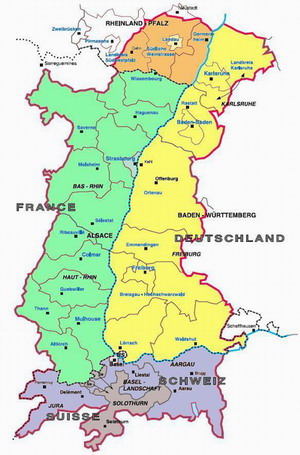INTERREG IV-A Projekt „Quality-oriented land use management in small and mid-scale communities in the Upper Rhine Area“
The three-year project was promoted by the European Union with EFRE funds in the context of the INTERREG IV-A program for cross-border cooperation in the Upper Rhine area. Collective project management institutions were the French-German Institute for Environmental Research (DFIU) at Karlsruhe Institute for Technology (KIT) and the Laboratory for Complex Geographic Systems of the Faculty of Geography and Management of Spatial Information at the University of Strasbourg. The project aims at the development of new approaches and tools for communal land use management in small and mid-scale communities in the research area.
Additionally, the project is promoted by regional partners: the Ministry for the Environment in Baden-Württemberg, the Conseil Régional d’Alsace, the Direction Régionale de l’Environnement, de l’Aménagement et du Logement (DREAL) and the Conseil Général du Bas-Rhin.
The tri-national region of the Upper Rhine area: an area to rethink land use management
The Upper Rhine area is an attractive and economically prospering region accelerating metropolisation. For each the French, the German and the Swiss areas the increasing land use is a major concern for the local communities, and the political discourse is practically unanimous: the land is a rare, non-renewable resource, which needs to be protected.
Therefore, a sustainable land use management is indispensable to reduce the increasing land use and its negative consequences and to create and secure a sustainable development in the Upper Rhine area.
The region is characterized by three different cultures of planning and communicating referring to a wide range of methods, experiences, concepts and ideas. The project is therefore focusing on this potential to generate new forms of tri-national land use management.
German and French mayors are mobilized ...
The mayors of the small and mid-scale communities are entrusted with the implementation of communal land use management. In most cases, they decide on the specific land use and the future city development projects in their communities. In these decisions, different actors with differing interests and conflicting goals have to be taken in account. Often, communities are only equipped with limited financial options. Thus, they are confronted with complex problems and difficult decisions.
In regularly held round tables, the mayors of the twelve Baden and Alsacian pilot communities together with their Swiss and Rhineland-Palatinate partners reflect on the topics related to land use management, which are of high significance for the small and mid-scale communities in the Upper Rhine area.
… with the approach of mutual learning
This cross-border exchange between the mayors is the starting point of more-detailed analyses, which also includes other actors concerning land use management such as French regional parks, regional federations etc. This exchange arouses new synergies: the complete chain of actors is mobilized, including private andbusiness actors as well as the local community members.
The results: new methods and tools for land use management
In addition to the exchange of know-how and experiences, innovative guidelines and tools for a quality-oriented land use management have been developed in close cooperation with the communities. These are of practical use for the small and mid-scale communities and help to enable an on-going discussion with all actors of land use management, based on a touring exhibition as well as regular excursions that were planned during this project.
- PILOT COMMUNITIES:
- Au am Rhein
- Bischweier
- Bollschweil
- CC de la Vallée de Kaysersberg
- CC de la Vallée de Saint-Amarin
- Chalampé
- Ebersheim
- Gengenbach
- Griesheim-sur-Souffel
- Nordrach
- Saales
- Sexau
- PARTNERS:
- Conseil Général du Haut-Rhin
- Kanton Basel-Landschaft
- Parc Naturel Régional des Ballons des Vosges
- Parc naturel Régional des Vosges du Nord
- Regionalverband Mittlerer Oberrhein
- Regionalverband Südlicher Oberrhein
- Struktur- und Genehmigungsdirektion Süd (SGD-Süd)
- Verband Region Rhein-Neckar
- FUNDING:
- Conseil Régional d'Alsace
- Conseil Général du Bas-Rhin
- Direction Régionale de I'Environnement, de I'Aménagement du Logement (DREAL)
- Europäische Union (Europäischer Fonds für regionale Entwicklung - EFRE - im Rahmen des INTERREG IV Programms Oberrhein)
- Université de Strasbourg
- Karlsruher Institut für Technologie
- Umweltministerium Baden-Württemberg

Copyright © SIGRS / GISOR
